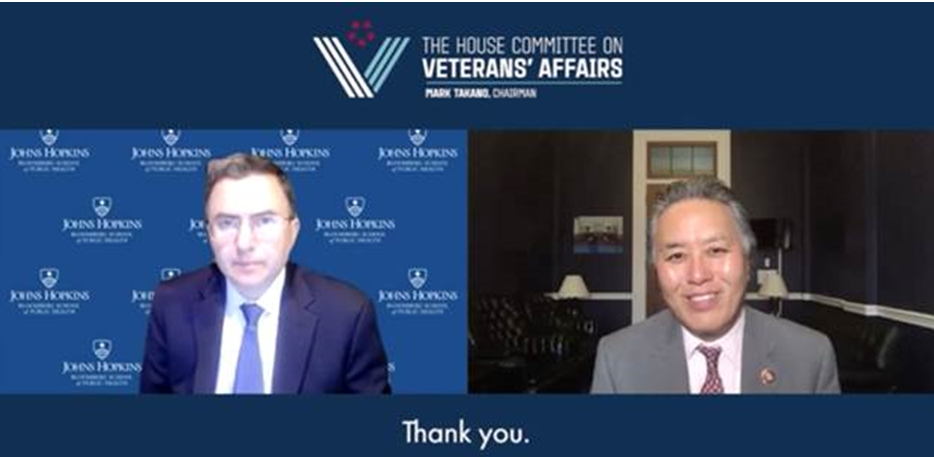Chairman Takano Speaks with Johns Hopkins University’s Dr. Josh Sharfstein to Discuss Contact Tracing and How Veterans Can Help Slow the Spread of COVID-19
Press Contact
Contact:
Jenni Geurink (202-819-4684)
Miguel R. Salazar
RIVERSIDE, CA — Last week, House Committee of Veterans’ Affairs Chairman Mark Takano (D-Calif.) spoke with Dr. Josh Sharfstein, Vice Dean of Public Health and Community Engagement at Johns Hopkins University, to discuss their innovative contact tracing training to slow the spread of COVID-19 and how veterans can get involved. This training is especially critical as veteran unemployment climbed to nearly 12 percent last month—veterans are already uniquely skilled to step up in times of crisis and could continue that legacy of service by becoming a contact tracer. See the full conversation with Dr. Sharfstein here.

Watch the full conversation here
“I have been following this issue very closely, and I am really encouraged that Johns Hopkins’ contact tracing training is becoming available, especially as unemployment numbers rise across the country. As Chairman of the House Committee on Veterans’ Affairs, I know we need to find new and innovative ways to get our veterans back to work, so thank you for your work here,” said Chairman Takano. “As we work on plans to reopen the country, we have to focus on testing, contact tracing, and isolation for those who test positive-- we need to support them. The next piece that I am trying to work with my colleagues on is to get people focused on that third piece-- services, housing, and nutrition-- all the things we need to do to support people. I want to say just how thankful I am for the work that you all are doing at Johns Hopkins. I know that this course was set up a few weeks ago--and the foresight you all had is tremendous.”
“Contact tracing is critical to finding where the virus is and trying to stop it from spreading to more people,” said Dr. Sharfstein. “We are trying to find people who may have been infected and advise them to stay home and isolate-- you see who is sick and make sure they get the support they need. Then you find out who they might have exposed and reach out to them before they get sick. Hopefully they can quarantine themselves, so that if they do get sick, they don’t pass it on to anyone else. It’s a very targeted response. People don’t need a PhD, you don’t need to be a doctor, and you don’t need to understand how the virus is transmitted to be a contact tracer. One of the things contact tracers need to do is ask how people are doing and find ways to support others. It is something we can all do together to slow down the virus. It has been a great thing to watch-- an institution really mobilized to help the country and the world. Thanks again, Chairman Takano for having me.”
For more information about the Committee’s efforts to address the COVID-19 crisis and resources available for veterans, please visit: https://democrats-veterans.house.gov/covid-19.
###
Next Article Previous Article
